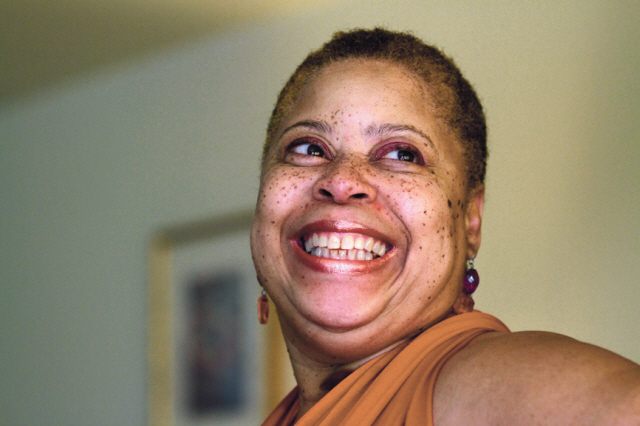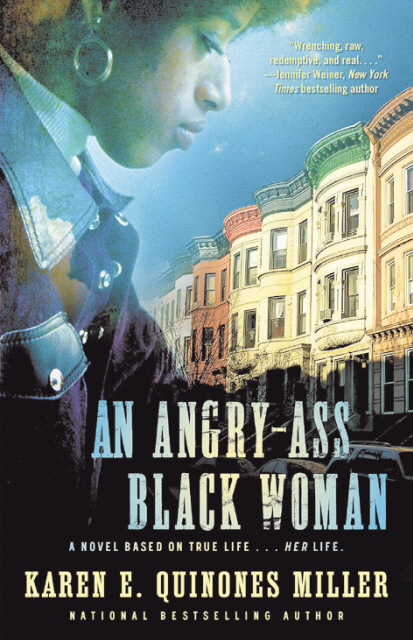Earlier this year, author Karen E. Quinones Miller found out that Walmart wouldn’t be carrying her semiautobiographical book on its shelves. The reason? There were concerns that the book’s title, “An Angry-Ass Black Woman,” might offend some of the retail giant’s customers.
Given Walmart’s reach, a lot of authors would have picked a new title and maybe rejiggered things for the sake of book sales.
Not Miller.
Her decision wouldn’t surprise anybody who knows Miller ― or anybody who’s actually read her work. After all, this is a woman who opens her book with this: “I ain’t scared of death. In fact, death can kiss my black ass ...”
“I don’t think there’s anything wrong with being an angry-ass black woman,” explained Miller, author of seven Essence best-selling novels including “Satin Doll,” “I’m Telling” and “Uptown Dreams.”
 |
Philadelphia novelist Karen Quinones Miller, pictured Sept. 26, talks about growing up poor in Harlem and surviving a major brain trauma that took away much of her memory, all topics she deals with in her new autobiographical novel, “An Angry-Ass Black Woman.” (David Swanson/Philadelphia Inquirer/MCT) |
 |
“An Angry-Ass Black Woman” by Karen Quinones Miller (MCT) |
As Miller sees it, some of the most notable black females in American history were angry-ass black women ― Rosa Parks, Harriet Tubman, Sojourner Truth and Washington, D.C., delegate Eleanor Holmes Norton.
“Rosa Parks got angry in that one moment and it changed things. She said ‘No. I’m not giving up that seat.’ That anger propelled the civil rights movement,” Miller pointed out. “Harriet Tubman got one whipping too many and she got angry. She said, ‘I’m not going to sit here and get whipped because I’m black. I’m leaving.’ She got angry not just on her own behalf but on behalf of her community, her people.”
“I’m sorry that people are assigning their own connotations, but I embrace my anger. It’s what’s gotten me through life,” she added. “I’m not looking for confrontation. That’s not what anger is about. But I embrace my anger and let it propel me in life. You can be wonderful, warm, talented and still angry.”
Miller may be right that the “angry” connotation isn’t always a negative. A study published earlier this year by Northwestern University’s Kellogg School of Management revealed that the stereotypical behavioral pattern can actually work in favor of black women in corporate leadership roles. The researchers discovered that dominant behaviors in the workplace often are rewarded when displayed by black women and white men, but not necessarily for white women and black men.
Miller and I are friends, and we’ve gone back and forth about this over the years, but I have to say that I hate the title of her book. When I read it while vacationing recently, I actually tore the cover off rather than alarm my fellow train passengers.
Miller may be telling a personal story about her experiences, but the title trades in one of the most enduring stereotypes around, a trope that affects black women daily. And lately, it’s become a staple of reality TV, with characters from Bravo’s “Real Housewives of Atlanta,” VH1’s “Basketball Wives” and “Love and Hip Hop” parlaying their eye-rolling, neck-swiveling encounters into additional screen time as well as spin-off shows.
It’s also often an unspoken subtext of television shows and publications that take on the so-called marriage crisis in the African-American community, as “Nightline” on ABC did a couple of years ago when it posed the question, “Why Can’t a Successful Black Woman Find a Man?” And it’s one that even first lady Michelle Obama had to confront during the 2008 presidential campaign.
I know Miller wasn’t trying to make some grand statement with the title of her novel. Naming the book “An Angry-Ass Black Woman” was just her way of describing her reaction to being raised desperately poor in Harlem, N.Y. ― and to losing both her parents at an early age.
“It’s my anger that kept me alive,” Miller, said referring to the significant health problems ― a brain tumor and multiple sclerosis ― that have troubled her in recent years. “I hope that I will always get angry because that reminds me that I’m alive and at the point that I don’t get angry anymore means I accept life as it is ... Anger is what makes you do something about what’s going on.”
In the book, Miller points to an incident that happened at this newspaper that led her to completely changing her life. She was working as a secretary in the Philadelphia Daily News’ circulation department and was outraged that a rally in Washington, D.C., supporting affirmative action hadn’t made it into the paper. Miller confronted an editor who told her, among other things, “It’s very easy for someone not qualified to write a news story to criticize someone who is.”
She walked away furious. But that moment turned out to be a turning point; that very day, Miller decided to quit her job and enroll at Temple University to study journalism. Never mind that she’d dropped out of school in the eighth grade and had spent much of her youth running the streets of New York City. After graduating with honors from Temple, she launched a successful career as a reporter at a number of major news outlets, including the Philadelphia Inquirer.
“If I hadn’t gotten so angry, I might still be a secretary,” Miller said.
Once while working at the Inquirer, Miller was heading back to her cubicle after telling off an editor who had taken out a colloquialism she had used in article, when one of her friends said, “You know, Karen, you really do have a chip on your shoulder.” Her response? “Better a chip on my shoulder than a knife in my back.”
Miller, though, is not nearly as antagonistic as the book’s title ― or some of the antics described in her memoir ― might imply.
She can still get fired up, especially when talking about something she considers to be an injustice, such as the killing of Trayvon Martin, the Florida teen shot by George Zimmerman earlier this year. But these days she’s more of a mother hen than anything, generously dispensing publishing advice and helping launch the careers of local authors such as Miasha (“Secret Society,” “Diary of a Mistress”), Daaimah Poole (“Yo Yo Love,” “Got A Man,” “What’s Real”) and Mister Mann Frisby (“Wifebeater,” “Blinking Red Light,” “Holla Back But Listen First: A Life Guide for Young Adults”). Over the years, Miller and I have gone from being work colleagues to the kind of friends who don’t talk often, but when we do, the conversations run deep.
“An Angry-Ass Black Woman” is no exception from the gritty page-turners Miller is known for producing. Even though her book is a fictionalized memoir, she has a way of getting out of the way of the story and letting the action and dialogue speak for itself. It’s a young woman’s coming-of-age story, told flashback style as Miller reflects on her life while comatose from a brain tumor.
And I have to admit: I loved every word ― except the title.
By Jenice Armstrong
(Philadelphia Daily News)
(MCT Information Service)









